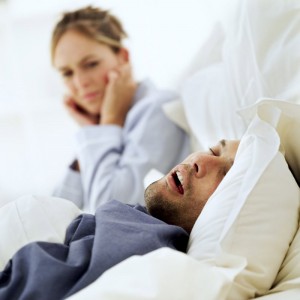 If you snore, you may think the worst thing about it is keeping your partner awake at night. For some snorers, however, snoring is a symptom of a dangerous and life-threatening condition known as sleep apnoea, in which the sleeper stops breathing for several seconds. These episodes occur repeatedly, as little as five times per hour to as often as thirty times per hour or more.
If you snore, you may think the worst thing about it is keeping your partner awake at night. For some snorers, however, snoring is a symptom of a dangerous and life-threatening condition known as sleep apnoea, in which the sleeper stops breathing for several seconds. These episodes occur repeatedly, as little as five times per hour to as often as thirty times per hour or more.
What is sleep apnoea?
An estimated 20% of adults are affected by sleep apnoea to some degree. The condition affects men more often than women, and those who are overweight are most likely to have these episodes. Sleep apnoea generally does not wake the sufferer, but it still impacts sleep quality. For those who sleep alone, the only noticeable symptom may be unexplained daytime drowsiness, making sleep apnoea difficult to diagnose without a sleep study.
During sleep, the airway is held open. In people with sleep apnoea, the muscles responsible for this weaken and allow the airway to become blocked. After a few seconds without breathing, a loud, sudden snore occurs as the sleeper struggles to take a breath. If you’ve had complaints of your snoring and you are frequently sleepy during the day, you may want to consider finding out if your snoring could be serious.
Complications of sleep apnoeea
People with sleep apnoea are often tired during the day, despite having slept all night. Frequent sleep disruptions can be just as harmful as lying awake with insomnia. Poor sleep quality can impair your ability to drive and can even aggravate certain health conditions, including:
- High blood pressure
- Cardiovascular disease
- Type 2 diabetes
- Obesity
- Chronic respiratory conditions
- Acid reflux
- Memory loss and confusion
Treating sleep apnoea
Those with mild sleep apnoea, experiencing between 5 and 14 episodes per hour, may have only mild daytime symptoms, such as drifting off while watching TV, reading, or engaging in other activities that don’t require much attention. These sufferers may be benefit from regular exercise, limiting alcohol, and establishing a regular bedtime routine. Even those with more severe sleep apnoea can benefit from these strategies, but more severe cases may require treatment. Depending on how severe your apnoea is, treatment options may include:
- Oral appliances designed to hold the airway open by gently pulling the jaw forward. Oral appliances can be custom fitted or purchased over the counter. Custom fitted appliances may be a bit more expensive than those purchased over the counter, but are generally less bulky and more comfortable.
- CPAP machines deliver continuous pressurized air into the lungs through a mask. This can be an effective treatment if used properly, but some find the mask uncomfortable and may have difficulty exhaling against the pressurized air.
- BIPAP machines are similar to CPAP machines, but the machine detects breathing patterns and reduces air flow on exhalation.
- Nerve stimulation delivers electrical impulses similar to a pacemaker. These impulses stimulate the nerves to open the airway. Using nerve stimulation to treat sleep apnoea is relatively new and may not work for all sufferers, but may be a good option for those who find CPAP or BIPAP masks uncomfortable.
- Surgery to remove or reposition excess tissue may help in the most severe cases. Due to risks inherent in surgery, it should be considered a last resort.
If your snoring is keeping your partner awake, especially if you spend the day feeling drowsy, an oral appliance may help you both sleep better. Please call Westside Dentistry to arrange an appointment on 07 3278 0580 now to find out how you could be sleeping better.
